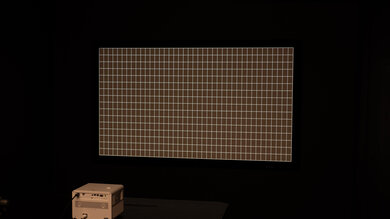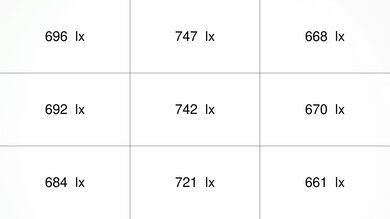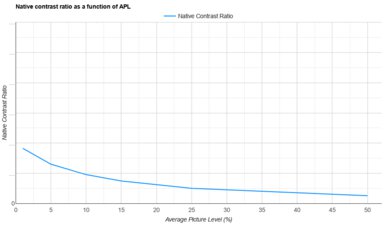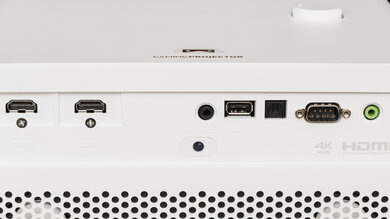
If you're searching for a home projector, image quality and features take precedence over portability. Sure, the ability to carry your projector from room to room is nice, but ultimately, you'll always have access to an outlet. You'll also have greater control over room conditions, like lighting, than if you were to take the projector outside. Thus, before shopping, consider the room, or rooms, where you hope to set up the projector. If the room has a few lights or windows, having a projector with higher peak brightness is more important than deep contrast. The inverse is true if you install the projector in a darker room. Also, consider the projector's primary usage. Will it solely be used for watching movies from physical media, or do you prefer streaming services? Or perhaps you're buying a projector to play games with your friends? All of these will guide you toward the best product for your needs.
We've bought and tested over 45 projectors, and below, we list the best overall projectors for home use, covering a few critical use cases from home theater to gaming. We only cover consumer models, not high-end products meant for enthusiasts. If you're specifically looking for a home theater projector, explore our recommendations for the best models for home theater use.
If you'd rather see a list of the best budget and cheap projectors on the market, look no further than our best cheap projectors. Want to take your projector outdoors? Consider our picks for the best outdoor projectors. And don't forget—you can even vote on which projectors you'd like us to purchase and put to the test!
-
Best Home Projector
Movies8.1Brightness8.2Contrast7.7Pre-Calibration Color Accuracy8.5ResolutionPixel Shift 4kSmart OSAndroidIf you're in the market for the best home projector, consider the BenQ X3100i. This projector stands out for its adaptability, offering advanced home theater capabilities and HDR10+ support. It's easily bright enough for moderately lit rooms, and its good contrast and wide color range ensure a pleasant viewing experience in dark rooms. Thanks to pixel-shifting technology, it delivers an image that stays sharp even when projected onto large surfaces. It's also highly accurate right out of the box, so even those who are particular about color accuracy will be largely pleased with this unit's performance without needing to calibrate it.
But it's not just about display capabilities—it's also a standout for streaming content. The included QS02 dongle supports Google Cast and Apple AirPlay, and it offers Wi-Fi 6 and Bluetooth 5.0 support, as well as native Netflix support. It's a great choice for gamers, with two HDMI 2.0b ports that can handle 4k @ 60Hz, 1440p @ 120Hz, and 1080p @ 240Hz signals. One of the unit's HDMI ports also doubles as an eARC port, which is great if you want to connect a soundbar. The third HDMI port, concealed behind the top cover, is intended for use with the included dongle but can also accommodate any HDMI device. Ultimately, it's the most adaptable projector we've tested and is the best option for anyone except perhaps ardent home theater fans.
-
Best Home Theater Home Projector
Movies8.2Brightness8.7Contrast8.0Pre-Calibration Color Accuracy8.6ResolutionPixel Shift 4kSmart OSNoIf you're seeking the ultimate home projector for watching movies, the Epson Home Cinema 3800 is a slightly better pick than the BenQ X3100i due to its edge in brightness and contrast. It's certainly bright enough to look great in moderately lit rooms, but it excels in darker settings due to its great contrast ratio, so install it in a dark basement for maximum impact. This model also delivers remarkable color accuracy, so there's no need to calibrate it to get an accurate picture. Its one weakness is its decent but unexceptional color gamut; it's wide enough for SDR content, but HDR content doesn't look as punchy. If that bothers you, consider an upgrade to the even more expensive Epson Home Cinema 5050UB, although it's not worth it for most users.
The Epson falters somewhat in its features; it's rather minimalistic. It lacks Wi-Fi or a built-in smart OS but offers Bluetooth. If smart features are important, consider investing in an external streaming dongle or buying the BenQ. Otherwise, the unit's two HDMI 2.0 ports allow for seamless connection to external devices, with both ports capable of handling a 4k @ 60Hz signal. Unfortunately, this projector doesn't support eARC, so you'll have to invest in a receiver or use the unit's audio out port for the best sound. Overall, the Epson is the go-to choice for enthusiasts looking to recreate a cinema experience in their basement.
-
Best Short-Throw Home Projector
Movies7.8Brightness6.7Contrast8.1Pre-Calibration Color Accuracy9.4ResolutionPixel Shift 4kSmart OSAndroidIf you prefer placing your projector close to the wall or screen, the BenQ X500i is a very good option. This short-throw projector can deliver large images from minimal distances, projecting a 60-inch display from just three feet away and scaling up to 120 inches from six to 7.2 feet. It offers impressive contrast, particularly in darker scenes, while maintaining solid performance even with brighter content. Its wide color gamut ensures a vibrant viewing experience, but it's not quite bright enough for colors to pop in well-lit rooms, so a dim environment will provide the best image quality. Finally, its image accuracy is top-notch, requiring no adjustments, even for video enthusiasts.
The X500i is feature-rich, as it comes with the same Android TV 11 QS02 streaming dongle as the more expensive BenQ X3100i. The dongle supports Google Chromecast, Apple AirPlay, Wi-Fi 6, Bluetooth 5.0, HDR10+, and native Netflix. The projector itself comes with three HDMI ports, one hidden under the top cover, all 4k @ 60Hz and 1080p @ 240Hz for gaming. The second HDMI port on the back also serves as an eARC port for advanced audio playback via a connected soundbar. Moreover, it features a USB-C port with DP Alt Mode, allowing content streaming from compatible devices. Overall, the X500i is the best short-throw projector we've tested, and its versatility also makes it one of the best projectors for bedroom use.
-
Best Dark Room Home Projector
Movies7.6Brightness6.4Contrast8.6Pre-Calibration Color Accuracy8.5Resolution1080pSmart OSNoIf you're mostly watching your projector in a darker room and don't need a ton of fancy features, consider the BenQ HT2060. It delivers a crisp 1080p image with excellent contrast. It even outperforms the more expensive BenQ X500i in light-controlled environments. It's also extremely accurate right out of the box, truly making it a cheaper home theater alternative to the Epson Home Cinema 3800. Keep in mind that its brightness is only mediocre, so try to stick to dimmer rooms for the best overall viewing experience, as it otherwise looks a bit washed out in brighter contexts.
Regarding features, it's a bit dry; it lacks a smart OS, Wi-Fi, and Bluetooth, but it does include a USB Type-A port for power delivery, which is convenient for powering a streaming dongle. Both HDMI ports support 1080p at 120Hz, which is convenient for gamers, although neither of the ports offers ARC/eARC capability. Instead, the projector has 3.5 mm audio in and out ports, alongside an optical connection. Overall, for those looking for a cheaper home theater option than some of the more expensive units above, this model fits the bill.
-
Best Budget Home Projector
Movies7.0Brightness8.4Contrast5.3Pre-Calibration Color Accuracy8.3Resolution1080pSmart OSNoIf you're looking for a budget unit, or if you're mostly watching in a moderately lit room, the Epson Home Cinema 1080 is a better choice than the BenQ HT2060, as the Epson is noticeably brighter, and cheaper. It also comes with a few more features than the BenQ, such as integrated Wi-Fi support, which lets you more easily cast content from your phone or laptop directly to the unit. However, there are two caveats with this unit: its contrast is underwhelming, and it has a narrow color gamut. Thankfully, neither of them really matters much if you're projecting images in brighter rooms, and that's where this unit shines.
Just keep in mind that while it does have Wi-Fi, it doesn't have an integrated OS, so you'll need a smart dongle if you want to access any streaming apps. You can also use its USB-B port to project supported content directly from a computer. It includes two 1080p @ 60Hz HDMI ports, although without ARC support. This means that you'll need to use its 3.5 mm audio out jack, or a receiver, to output sound, as the projector itself only has a small 2W mono speaker. Overall, the Epson Home Cinema 1080 is the best value home projector for bright rooms, offering versatility and ease of use in spaces with natural or artificial light.
-
Best Cheap Home Projector
Movies6.3Brightness5.1Contrast8.8Pre-Calibration Color Accuracy3.9Resolution1080pSmart OSAndroidIf the budget option above is still too pricey, check out the NexiGo PJ40 (Gen 3)—the best cheap home projector out there. It's not as bright as the Epson Home Cinema 1080, but its excellent contrast makes it a fantastic cheap choice for dark rooms. That said, it's not ideal for well-lit spaces due to being a bit dim, and its colors can look muted because of the projector's underwhelming brightness and narrow color gamut. The color accuracy also isn't great out of the box, so if you're picky about that, a quick calibration can work wonders.
On the features side, it's loaded for the price. You get Bluetooth 5.1, Wi-Fi, and casting via Miracast or Apple AirPlay. The Android TV interface is basic, as it doesn't have any apps, so if you stream content a lot, you'll want to hook up a Chromecast or Fire Stick to the unit. It also has two HDMI ports (one with ARC for soundbars), a decent 20W speaker system, a Game Mode, and HDR10 support. Overall, the NexiGo isn't the brightest or most colorful, but it's a steal for anyone looking to enjoy movies or gaming in a dark room without breaking the bank.
Notable Mentions
- BenQ TH671ST:
The BenQ TH671ST competes directly with the Epson Home Cinema 1080, although the BenQ performs better in darker environments, while the Epson is better in brighter ones. Ultimately, the BenQ is more expensive and harder to find than the Epson, giving the latter the edge.
See our review - Epson EpiqVision Flex CO-W01:
The Epson EpiqVision Flex CO-W01 is a steal at its price, as it’s one of the brightest projectors you can buy. This makes it a particularly good budget option for bright living rooms. Unfortunately, it’s very bare-bones when it comes to features, and its contrast is quite poor, making the NexiGo PJ40 (Gen 3) a better choice for most people.
See our review - Epson Home Cinema 5050UB: Although the Epson Home Cinema 5050UB is the top home theater projector we've evaluated, it provides only a marginal enhancement over the considerably less expensive Epson Home Cinema 3800. Plus, its limited feature set can't match the versatility of the cheaper BenQ X3100i. See our review
- Hisense PX3-PRO:
The Hisense PX3-PRO is a fully featured ultra-short-throw projector with an incredibly wide color gamut and is a great choice if you're in the market for a home theater projector or looking for the best projector for bedroom use. Still, the Epson Home Cinema 3800 surpasses the Hisense in brightness and accuracy and is sold for far less, making it the better value for most people.
See our review
Recent Updates
-
Ensured that our picks are all widely available for purchase.
-
Moved the BenQ TH671ST to the Notable Mentions, as it's harder to find than it used to be, at a slightly higher price. The Epson Home Cinema 1080 is now the 'Best Budget Home Projector' and the BenQ HT2060 is the 'Best Dark Room Home Projector.'
-
Made sure that all of our picks are still widely available for purchase.
-
The Hisense PX3-PRO replaced the NexiGo Aurora Pro in the Notable Mentions due to the Hisense's slightly superior performance and more impressive feature set.
-
Added the NexiGo PJ40 (Gen 3) as our new 'Best Cheap Home Projector' pick due to its incredible value. We've also added the Epson EpiqVision Flex CO-W01 to the Notable Mentions.
All Reviews
Our recommendations above are what we think are currently the top home projectors for most people to buy. We factor in the price (a cheaper projector wins over a pricier one if the difference isn't worth it), feedback from our visitors, and availability (no models that are difficult to find or almost out of stock everywhere).
If you'd like to do the work of choosing yourself, here's the list of all our projectors. Be careful not to get too caught up in the details. While no projector is perfect, many are good enough for most uses; however, avoid the worst models to ensure adequate quality.
Comments
Best Home Projectors: Main Discussion
What do you think of our picks? Let us know below.
Looking for a personalized buying recommendation from the RTINGS.com experts? Insiders have direct access to buying advice on our insider forum.
Update: Ensured that our picks are all widely available for purchase.
What do you think of these changes? Let us know






































